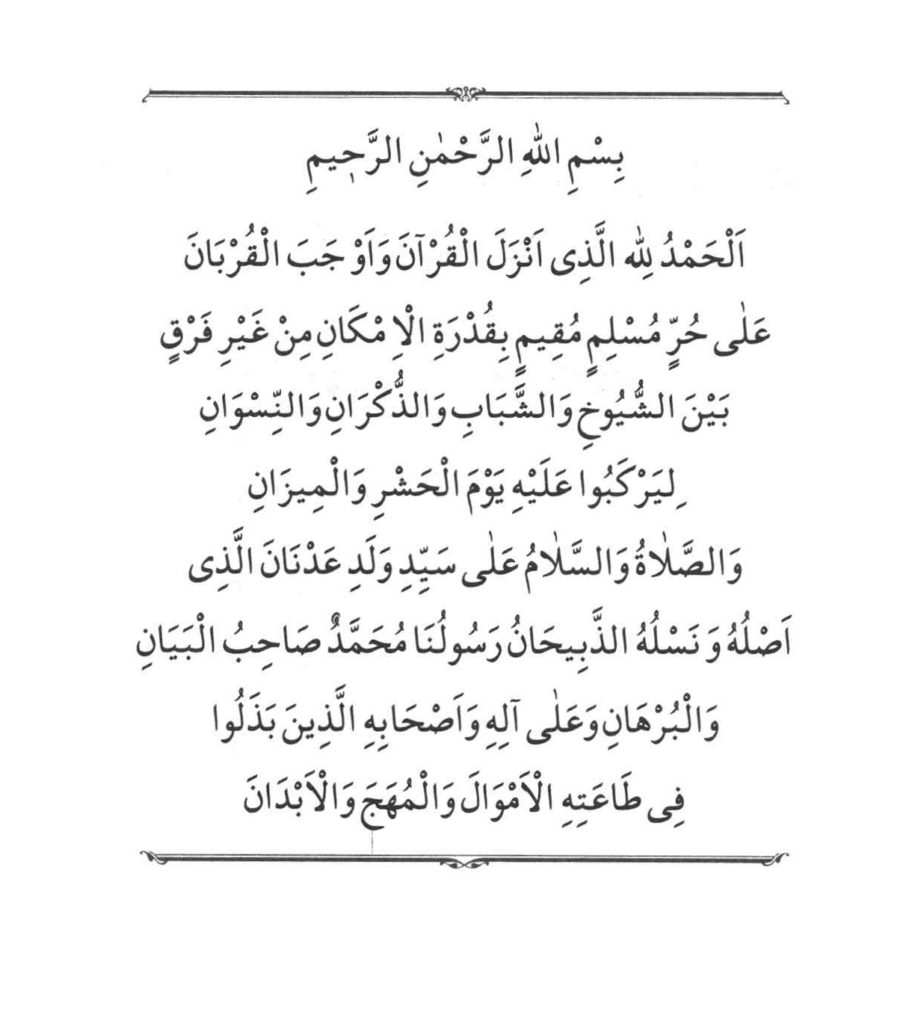A GUIDE TO UDHIYYAH (SACRIFICE) and EID AL-ADHÂ
Every Muslim , in possession of a Nisâb amount in wealth or money, in surplus of their primary and essential necessities and debt liabilities , are obliged to practice Udhiyyah (sacrifice) once a year on one of the days of Eid Al-Adhâ which fall on the 10th , 11th and 12th days of Dhul-Hijjah . (Nisâb is the minimum amount that a Muslim must have before being obliged to pay Zakâh, offer sacrifice etc. ) The matters pertaining sacrifice have been collected through reliable sources and are presented in the following pages. All success belongs to Allâh ( Ta’âlâ)
M. Hulûsi
WHAT IS UDHIYYAH ?
Udhiyyah is one of the five animals (sheep, goat, cattle, camel and buffalo ) which are offered as sacrifice on the 10th, 11th, 12th days of Dhul-Hijjah in order to fulfil a Wajib ( incumbent) act of ibâdah (worship ) and closeness to Allâh ( Ta’ala ).
THE AHKAM (RULINGS) OF UDHIYYAH
Udhiyyah ( sacrifice) is Wajib ( incumbent) and is mentioned in following Hadîth Sharîf :
من وجد سعة قلم يضح فلا يفترتين مضتا
“ Whoever has the capacity to offer an Udhiyyah (sacrifice) but does not do so should not approach the place where the Eid Salâh is performed” (Ibn Mâjah ). It also comes in another Hadîth sharîf as “They will not attain our shafa’ah (intercession ).”
The act of sacrifice is only fulfilled if the animal is qualified for Udhiyyah, which will be explained in the following chapters . If the sacrifice of the animal is not performed within the prescribed days and the animal’s value is given as Sadaqah ( charity ), this would not be accepted as the obligation having been fulfilled . (Wahdatî)
If a person who is financially well off (shar’î rich ) does not offer the sacrifice and misses itsprescribed time, he is obliged to give the value of the sacrifice as Sadaqah . However, if the mentioned person is not financially well off (shar’îpoor) or is someone who has vowed to offer the sacrifice, then it would be necessary for them to give the sacrificial animal itself as Sadaqah .
Once Sadaqah Al-Fitrah and Udhiyyah become Wajib (incumbent) upon a person and he loses his wealth , the obligation continues to remain until it is fulfilled one day. In this case, it becomes Wajib to give it as Sadaqah, either in its value or the sacrificial animal itself.
If the animal is sacrificed and the blood is discharged , yet the meat of the animal is somehow spoilt, the obligation is fulfilled . It is not necessary to sacrifice another animal. (Hindiyyah)
Free and Muqim ( resident) Muslims, who are in possession of the Nisâb amount of wealth, are recommended to offer sacrifice on behalf of theiryoung children . This is Mustahab (recommended) . The rule is mentioned like that in Zâhir Al-Riwâyah and the fatwâ ( ruling) is passed accordingly. However, according to the narration of Imâm Hasan (Rahmatullahi Alayhi), which he reports from Imâm Abû Hanîfah (Rahmatullâhi Alayhi); it is Wajib (incumbent) to offer Udhiyyah for his young children and grandchildren who have no parents . Imâm Qudûrî(Rahmatullâhi Alayhi) preferred the narration of Imâm Hasan (Rahmatullâhi Alayhi) in this regard. Since sacrifice is a Mâlî ibâdah (a form of worship through financial means) , even children who are (shar`î) rich are required to offer Udhiyyah independently. (Sahib Al Hidâyah)
If a person is close to death while he has his obligations of Zakâh, Hajj, Sadaqah Al Fitrah , expiation for an oath and Udhiyyah unfulfilled yet , he can will all these be paid from one third of his wealth . If one third of his wealth is sufficient to cover all , then they must all be settled with it . If not, Zakâh must be considered first. Then the sequence should be as Hajj , Sadaqah Al-Fitrah and expiation for oath. Finaly, Udhiyyah is paid if there is still possessions available. ( Sirâjiyyah )
THE CONDITIONS FOR SACRIFICE TO BE WAJIB (INCUMBENT)
Udhiyyah is Wajib for all free, Muqim ( resident) Muslims (male or female) upon whom Fitrah is Wajib . A free, Muqîm (resident), (shar’î) rich , male or female Muslim who is obliged to pay Fitra is also obliged to offer Udhiyyah (Wajib ). Udhiyyah is not Wajib upon the Musafir ( traveller ) [Musâfir: One who begins a journey ofat least 90 km distance]. If Musâfir wants to offer sacrifice as Nafil ( voluntary), it is permissible .
The case of a person who purchases an animal with the intention of Udhiyyah while he is Muqîm ( resident) begins a journey before the end of the prescribed sacrifice time (the third day of Eid al -Adhâ ):
- If he is (shar`î) rich , he is allowed to sell the animal . There remains no compulsion on him to perform the sacrifice (not Wajib) .
- If he is (shar` î) poor, he is not allowed to sell the animal as he had already bought it with the intention of sacrifice hence made it Wajib ( incumbent) on him to sacrifice.
According to Imâm Azam (Rahmatullahi Alayhi) and Abû Yû suf (Rahmatullâhi Alayhi), sanity and bulû gh (age of puberty) are not among the conditions of being liable for the sacrifice. Parents or guardians of the insane and the children under the age of bulû gh can do the Udhiyyah from their possessions , on their behalf, and feed them with the meat. The remainder of the meat can be exchanged for some necessities which can be used, such as clothing.

